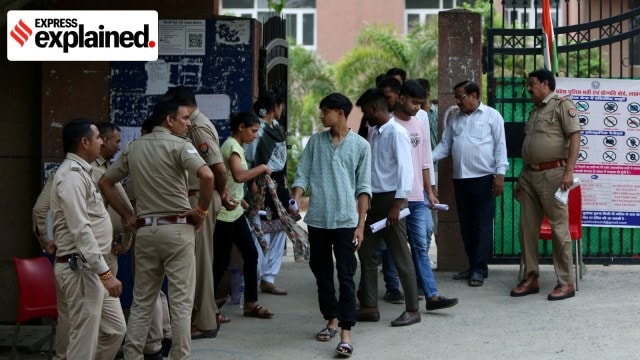Why Odisha govt will bring in law to prevent cheating in recruitment exams
If the director, senior management or the persons in charge of the service provider firm found of committed any offence under the law, they will be liable for imprisonment for a term not less than three years which may extend to ten years and with a fine of Rs 1 crore, according to the new law
 All offences under the new law will be cognisable, non-bailable and non-compoundable. (Representational image/Express photo)
All offences under the new law will be cognisable, non-bailable and non-compoundable. (Representational image/Express photo)The Odisha government has decided to enact a new law with stringent penal provisions to check cheating and other discrepancies in public examinations conducted by various recruitment agencies of the state.
Officials said the proposed law would be aimed at effectively and legally deterring persons, organised groups, or institutions that indulge in various unfair means and adversely impact the public examination systems for monetary or wrongful gains. Currently, there is no specific law in Odisha to prevent cheating in examinations.
The government plans to pass the law — known as the Odisha Public Examination (Prevention of Unfair Means) Act, 2024 — in the ongoing session of the state assembly.
Offences under the purview of the law
According to the proposed law, actions such as leaking question papers, providing solutions to questions by unauthorised persons during the examination, and tempering with answer sheets or any documents for shortlisting candidates are offences. Violation of security measures to facilitate unfair means, tempering with computer networks or systems, manipulation in seating arrangements, and creation of fake websites to cheat or for monetary gain are also offences.
The law says it is an offence for the service provider to hold examinations in alternative premises without the written approval of the public examination authorities.
Punishment for offences
All offences under the new law will be cognisable, non-bailable and non-compoundable. Any person resorting to unfair means and offences under this law will be punished with imprisonment for a term not less than three years which may extend to five years and with a fine of up to ten lakh rupees.
The service provider shall also be liable to be punished with the imposition of a fine up to Rs 1 crore while there is also a provision to recover the proportionate cost of examination from the service provider. In such a case, it would be barred from being assigned with any responsibility for the conduct of any public examination for four years.
If the director, senior management or the persons in charge of the service provider firm found of committed any offence under the law, they will be liable for imprisonment for a term not less than three years which may extend to ten years and with a fine of Rs 1 crore.
Similarly, if a person or group of persons including the examination authority or any other institution commits an organised crime, they will be punished with imprisonment for a term not less than five years, which may extend up to ten years and with a fine of not less than Rs 1 crore. If an institution is involved in committing an organised crime, its property shall be subjected to attachment and forfeiture and the proportionate cost of examination shall also be recovered from it.
An officer not below the rank of deputy superintendent of police (DSP) or assistant commissioner of police (ACP) can only investigate the offences under this proposed law.
Why the law is needed
In October, hundreds of job seekers in Odisha staged protests demanding the cancellation of online examinations conducted by various public examination authorities for recruitment to posts such as revenue inspectors, Amin, ICDS supervisors and statistical officers citing massive discrepancies in the way the exams were conducted.
Recently, there were allegations about examinations being conducted in various cyber cafes and small computer centres in shopping malls without proper security arrangements. Last year, the Odisha Staff Selection Commission had to cancel and reschedule the examination for recruitment to fill a total of 1,225 vacancies of which 1,008 are for the post of junior engineer (civil) and the remaining 217 are for the assistant training officer following question paper leak.



- 01
- 02
- 03
- 04
- 05



































